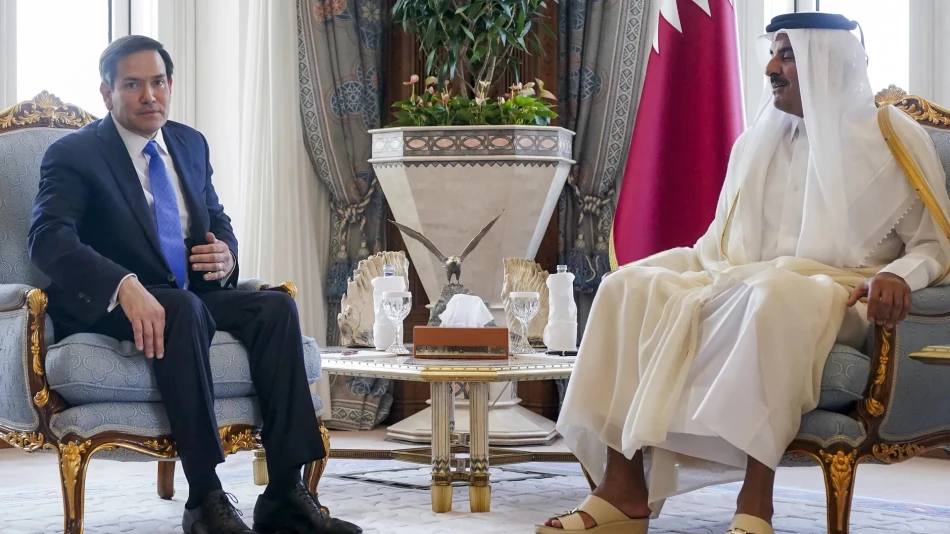
Qatar Seeks Israel's Apology to Resume Gaza Mediation Efforts
Qatar Demands Israeli Apology Before Resuming Gaza Peace Mediation
Qatar has demanded an official apology from Israel for its unprecedented airstrike on Doha before the Gulf nation will resume its crucial role as mediator in Gaza ceasefire negotiations, according to informed sources. The demand represents a significant diplomatic test for Israeli Prime Minister Benjamin Netanyahu, whose government faces the delicate balance of salvaging relations with a key regional broker while managing domestic political pressures from his hardline coalition.
First Gulf Strike Creates Diplomatic Crisis
The Israeli airstrike on Qatar marked the first time Israel has conducted military operations against any Gulf Cooperation Council member state, dramatically escalating regional tensions and deepening Israel's diplomatic isolation. The attack, which resulted in the death of a Qatari security officer, has forced the Trump administration into urgent damage control mode as it seeks to revive stalled Gaza negotiations.
According to high-level Israeli officials, Netanyahu's government severely underestimated the diplomatic fallout from targeting Qatar. The miscalculation has jeopardized one of the few remaining channels for meaningful dialogue on Gaza, particularly given Qatar's unique position as host to both Hamas leadership and major U.S. military installations.
Trump Administration Scrambles to Repair Relations
The apology demand came directly from Emir Tamim bin Hamad Al Thani during his Tuesday meeting with U.S. Secretary of State Marco Rubio in Doha. The request has since been central to discussions between Rubio, Netanyahu, and key American mediators including envoy Steve Witkoff and Israeli Strategic Affairs Minister Ron Dermer.
Witkoff is scheduled to meet with Qatari Prime Minister Mohammed bin Abdulrahman Al Thani in New York to negotiate terms for resolving the crisis and resuming peace talks. The urgency reflects the Trump administration's recognition that Qatar's mediation role is irreplaceable in current Middle East dynamics.
Flexible Framework for Face-Saving Solution
Qatari officials appear willing to accept a carefully crafted apology that focuses specifically on the death of their security officer, includes compensation for his family, and provides assurances against future sovereignty violations. This approach suggests Qatar understands the political constraints facing Netanyahu's coalition while maintaining its demand for accountability.
Historical Precedent Offers Roadmap
Israel has navigated similar diplomatic crises through strategic apologies. In 2013, Netanyahu apologized to Turkish President Recep Tayyip Erdogan for the deaths of Turkish activists during the 2010 Gaza flotilla incident. That precedent demonstrates Israel's willingness to issue formal apologies when strategic relationships are at stake, though the domestic political costs remain significant.
The current situation differs in that Qatar's role as Gaza mediator makes it indispensable to both Israeli security interests and American diplomatic objectives. Unlike the Turkish relationship, which focused primarily on economic and NATO considerations, Qatar's mediation capacity directly impacts Israel's most pressing security challenge.
Regional Implications Beyond Gaza
The crisis extends beyond immediate Gaza negotiations to broader regional realignment dynamics. Qatar's position as a bridge between Western allies and regional actors including Iran makes its relationship with Israel crucial for long-term Middle East stability. The Gulf nation's hosting of the largest U.S. military base in the region adds another layer of strategic complexity.
For Netanyahu, the apology decision represents a test of pragmatic diplomacy versus ideological positioning. His hardline coalition partners view any apology as weakness, while security establishments recognize Qatar's irreplaceable role in managing Gaza's humanitarian and security challenges. The outcome will likely signal whether Israel prioritizes tactical political gains or strategic diplomatic necessities in its regional approach.
Most Viewed News

 Sara Khaled
Sara Khaled






